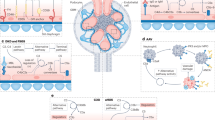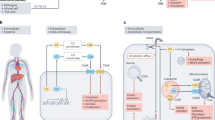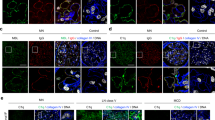Abstract
AN immunological mechanism has been postulated to explain some features of human glomerulonephritis1. In acute glomerulonephritis in man and in the acute stage of experimental nephrotoxic (Masugi) nephritis the level of serum complement (C′) drops2,3 and C′ has been demonstrated in the kidney lesions by immuno-fluorescent techniques4,5. Since C′ is a lytic agent for some bacteria and for isolated mammalian cells ‘sensitized’ by specific antibodies, the question arises whether C′ plays an active or an incidental part in these kidney lesions. The evidence in favour of an active role is, as yet, only circumstantial, since C′ is bound in serological reactions not only when it is necessary for them, as in immune lysis, but also when it is not, as in agglutination or precipitation. More pertinent is the observation that avian antisera, reportedly poor complement fixers, usually cause nephrotoxic nephritis only after a latent period of several days, while rabbit antisera can cause it immediately6. The delayed nephritis has been ascribed to the rat's own antibodies against the heterologous anti-kidney anti-bodies, localized in kidneys. However, this comparison between avian and rabbit antisora is of dubious validity because of our ignorance of the serological specificity of those antisera (which may or may not be identical) as well as of their antibody content (which is usually compared only on the basis of their nephrotoxic effect—the very variable under investigation).
This is a preview of subscription content, access via your institution
Access options
Subscribe to this journal
Receive 51 print issues and online access
$199.00 per year
only $3.90 per issue
Buy this article
- Purchase on Springer Link
- Instant access to full article PDF
Prices may be subject to local taxes which are calculated during checkout
Similar content being viewed by others
References
Fishel, E. E., J. Chron. Dis., 5, 34 (1957).
Lange, K., Wasserman, E., and Slobody, L. B., Ann. Int. Med., 53, 636 (1960).
Ogawa, S., and Sato, Y., Trans. Soc. Path. Jap., 28, 212 (1938).
Freedman, P., and Markowitz, A. S., J. Clin. Inves., 41, 328 (1962).
Klein, P., and Burkholder, P., Deutsch. Med. Wschr., 84, 2001 (1959).
Vogt, A., and Kochem, H. G., Amer. J. Path., 39, 379 (1961).
Taranta, A., and Franklin, E. C., Science, 134, 1981 (1961).
Nisonoff, A., Wissler, F. C., Lipman, L. N., and Woernley, D. L., Arch. Biochem. Biophys., 89, 230 (1960).
Ovary, Z., and Taranta, A., Science, 140, 193 (1963).
Nisonoff, A., Wissler, F. C., and Lipman, L. N., Science, 132, 1770 (1960).
Kabat, E. A., J. Exp. Med., 69, 103 (1939).
Porter, R. R., Biochem. J., 73, 119 (1959).
Kabat, E. A., and Mayer, M. M., Experimental Immuno-chemistry, Second ed., 214 (Thomas, Springfield, Ill., 1961).
Author information
Authors and Affiliations
Rights and permissions
About this article
Cite this article
TARANTA, A., BADALAMENTI, G. & COOPER, N. Role of Complement in Nephrotoxic Nephritis. Nature 200, 373–375 (1963). https://doi.org/10.1038/200373b0
Issue Date:
DOI: https://doi.org/10.1038/200373b0
This article is cited by
-
The role of complement in experimental disease models
Springer Seminars in Immunopathology (1984)
-
Speciesbedingte Unterschiede im Ablauf der experimentellen Nephritis der Ratte nach Injektion von Kaninchen- und Enten-Antirattennierenserum
Virchows Archiv f�r Pathologische Anatomie und Physiologie und f�r Klinische Medizin (1965)
Comments
By submitting a comment you agree to abide by our Terms and Community Guidelines. If you find something abusive or that does not comply with our terms or guidelines please flag it as inappropriate.



